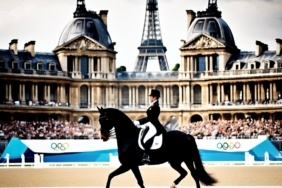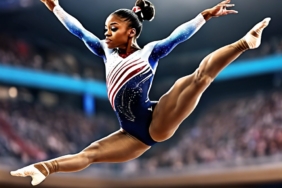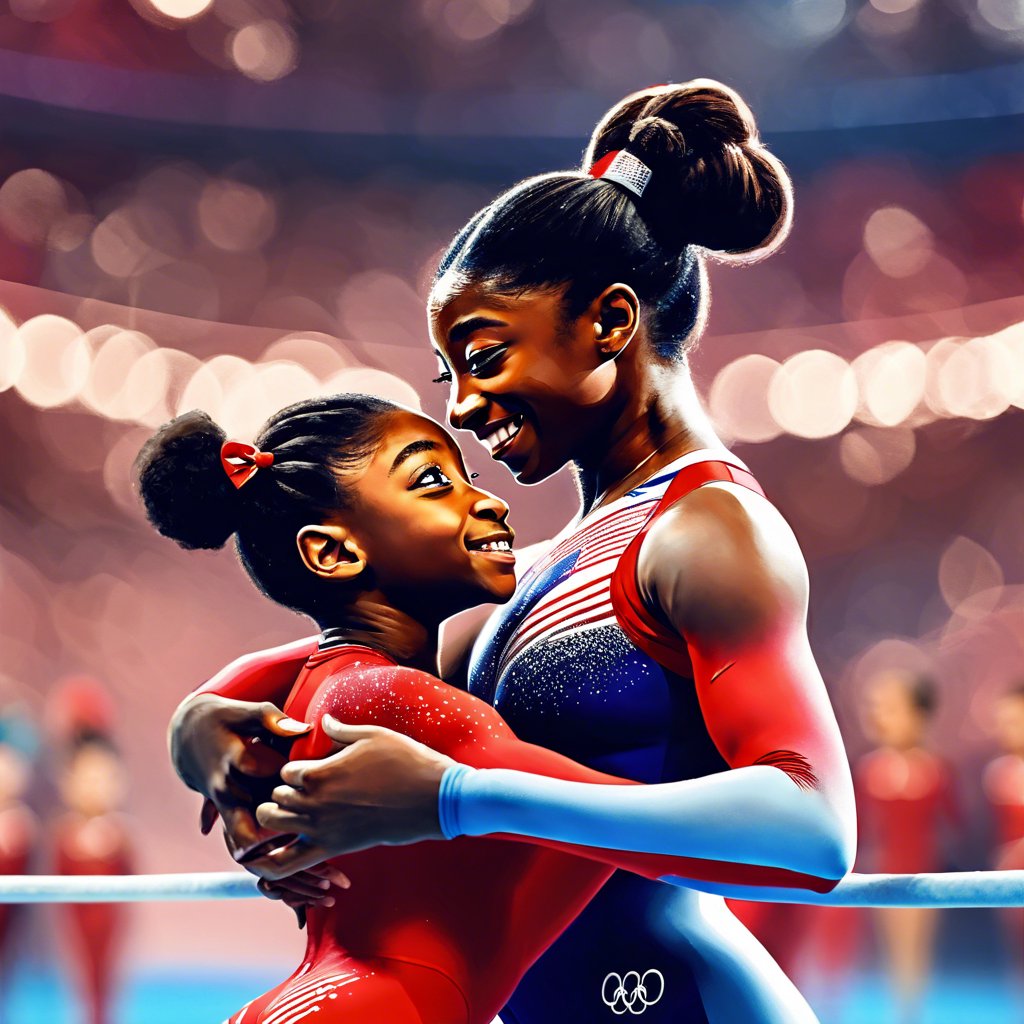Simone Biles Shines in Paris, but Humanity Shows
PARIS — Manila Esposito, who clinched a bronze medal on the balance beam, looked momentarily frozen, captivated by the bustling atmosphere of a post-meet press conference. As she began to speak, her voice was almost a whisper, prompting Simone Biles to lean in and adjust Esposito’s microphone, encouraging the Italian gymnast to share her thoughts. Later, when the moderator directed a question towards Alice D’Amato, Esposito’s teammate, it took D’Amato a beat to gather her response. Just as the moderator was about to step in, Biles kindly reminded everyone that the translation for the earpieces requires a little more time to process.
Every so often, a reminder surfaces: Simone Biles is 27 years old. This is not her debut in the spotlight. She possesses a wealth of experience with microphones, translations, triumphs, and even the occasional setback. Biles began her international competition journey over a decade ago, as a braces-clad 16-year-old who wasn’t even old enough to drive. She was still a minor during the Rio Olympics in 2016.
Now, as a married woman, Biles faces questions about her future, with some eagerly inquiring about her thoughts on the 2028 Los Angeles Olympics even before she concluded her events in Paris. Initially, she responded with a noncommittal remark, stating that competing on her home turf would be wonderful, but she also recognized that age isn’t just a number. “I’m old,” she quipped, laughing at the notion.
Later, she expressed her frustration via social media platform X. “You guys really gotta stop asking athletes what’s next after they win a medal at the Olympics,” she tweeted, adding, “Let us soak up the moment we’ve worked our whole lives for.”
- Follow our live coverage of the 2024 Paris Olympics
This sentiment captures the essence of the moment. However, in Biles’ case, the narrative needs a shift. It is the spectators who should practice appreciation, instead of clinging desperately to the hope of more to come. Biles has become a constant in the sporting world, a figure so reliable that her presence feels like a guarantee. Neither age, injuries, nor the mental health battles she has faced have managed to deter her. She comes back every time, leading us to worry: What if this is her last appearance?
It very well could be. Her coach, Cecile Landi, is set to depart to become the head coach at the University of Georgia, with her husband and co-coach, Laurent, planning to follow suit in a year after their daughter graduates from college. It seems like a perfect transition. Biles has nothing left to prove, but therein lies the intrigue: this journey ceased to be about proving anything three years ago.
Back in Tokyo, Biles faced the twisties, a phenomenon that caused her to grapple with her mental health challenges. She bravely opened up about the abuse she endured at the hands of Larry Nassar and courageously questioned USA Gymnastics’ accountability before the Senate Judiciary Committee. She explored her own motivations, confronting the difficult questions of what she truly wanted from life. In a bold move, she took a year off from a sport that is notoriously unkind to aging athletes, seeking to rediscover her love for gymnastics.
“To do the work, the personal work to be here and to perform, it’s amazing,” Laurent Landi remarked. “It just shows how tough the mind is, and that if you heal it properly, you can be very, very successful.”
Biles is far from fading away. Throughout the week in Paris, she contended with a persistent calf injury, originally sustained prior to the trials, which had been aggravated during the qualifications. Doctors wrapped her leg throughout the competition. While Biles downplayed the injury’s severity—jokingly chastising reporters for their curiosity—Landi acknowledged that managing the pain was essential, not eliminating it entirely. “It was bothering her, of course,” he said. “Was it impacting her performances? I don’t think so.”
Landi smirked, almost challenging the skeptics with a glance that seemed to say, “You tell me.” Four medals, three of which were gold, outnumbering the medal count of all but 22 nations competing in Paris so far.
The final day was anticipated to be a grand celebration, a fitting farewell. Instead, it unveiled Biles’ vulnerability. She was fatigued, having competed in four of the week’s five days. Mental exhaustion also weighed heavily on her, as the pressure to rectify the disappointment of Tokyo lingered in her thoughts. The event finals felt different, too. Instead of lively music accompanying the gymnasts’ performances, Bercy Arena transformed into a cathedral of silence, with spectators behaving almost reverently, tsk-tsking at anyone who dared to react when a gymnast executed a skill perfectly on the beam.
“We asked several times if we could have some music or background noise,” Biles shared. “So I’m not really sure what happened there.”
These are not excuses; they are the realities of competition. The beam turned into a battlefield, with medals awarded to those who managed to stay on. Three women, including Sunisa Lee, fell during their routines, while two others experienced serious balance checks. Yet when Biles missed a landing on her back layout step-out and fell, the arena gasped audibly. After the competition concluded, a mother in line at the Bercy Arena concessions lamented to her young daughter, “I feel so bad for Simone.” To which the daughter, wide-eyed, replied, “She fell,” as if witnessing a masterpiece being marred or a symphony interrupted.
Regardless of the outcome, Biles will forever be remembered for her gymnastics excellence, but her true legacy may lie in her leadership and courage beyond the mat. (Naomi Baker / Getty Images)
In her defense, the girl couldn’t have been any older than 8, and in her short life, Biles has epitomized Olympic perfection. Prior to the beam final, Biles had participated in nine different Olympic events throughout her career, including team, all-around, and event finals, medaling in each one, and earning gold in seven.
Then came the moment when her humanity surfaced once more. Two hours after her beam mishap, Biles returned for the floor exercise—an event she has never lost in either the Olympics or the World Championships. However, she landed awkwardly during warm-ups, seemingly aggravating that same calf injury. After a brief treatment, Biles nevertheless took to the floor and successfully landed her first tumbling pass, momentarily restoring order. But on her second and fourth passes, she stepped out of bounds, costing her precious tenths of a point, placing her second to Brazil’s Rebeca Andrade.
It’s worth noting that she faltered on two moves that were named after her, skills that no one else even attempts. This is Biles’ own definition of failure.
What then constitutes her definition of success? If you were to ask Biles, she would say it’s found not in the medals or her physical prowess, but in the raw authenticity displayed on the final day of competition. She takes pride in her achievements but expresses even greater pride in the person she has evolved into and the lives she believes—accurately—she has impacted.
“Putting your mental health first, and taking time for yourself, whether you’re in sports or not, it’s about longevity,” she explained. “Longevity in sports specifically, but also for a better, healthier lifestyle.”
Not far from where Biles competed, a woman strolled down a Parisian sidewalk, accompanied by her friendly Australian Shetland sheepdog. Stopping to chat with fellow dog lovers, she revealed that she was French but had come to Paris to enjoy the Olympics. Upon learning that her new friends were from the U.S., she immediately expressed her admiration for the “American gymnast.” She had watched Biles’ documentary on Netflix and praised her for initiating conversations surrounding mental health.
“I am not an athlete,” she remarked, but she felt grateful that Biles made it acceptable to “talk about” personal struggles. “I appreciate that.”
If this truly is the end of Biles’ journey, we should all take a moment to appreciate the legacy of Simone Biles.
(Top photo of Simone Biles with her gold medal from the vault competition: Tom Weller / VOIGT / GettyImages)
















